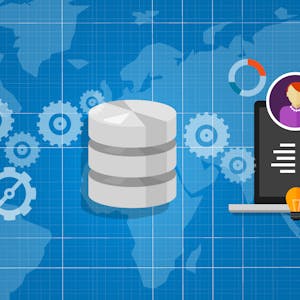Introduction to Data Engineering
This course introduces you to the core concepts, processes, and tools you need to know in order to get a foundational knowledge of data engineering. You will gain an understanding of the modern data ecosystem and the role Data Engineers, Data Scientists, and Data Analysts play in this ecosystem. The Data Engineering Ecosystem includes several different components. It includes disparate data types, formats, and sources of data. Data Pipelines gather data from multiple sources, transform it into analytics-ready data, and make it available to data consumers for analytics and decision-making. Data repositories, such as relational and non-relational databases, data warehouses, data marts, data lakes, and big data stores process and store this data. Data Integration Platforms combine disparate data into a unified view for the data consumers. You will learn about each of these components in this course. You will also learn about Big Data and the use of some of the Big Data processing tools.
A typical Data Engineering lifecycle includes architecting data platforms, designing data stores, and gathering, importing, wrangling, querying, and analyzing data. It also includes performance monitoring and finetuning to ensure systems are performing at optimal levels. In this course, you will learn about the data engineering lifecycle. You will also learn about security, governance, and compliance.
Data Engineering is recognized as one of the fastest-growing fields today. The career opportunities available in the field and the different paths you can take to enter this field are discussed in the course.
The course also includes hands-on labs that guide you to create your IBM Cloud Lite account, provision a database instance, load data into the database instance, and perform some basic querying operations that help you understand your dataset.
List basic skills required for an entry-level data engineering role.
Discuss various stages and concepts in the data engineering lifecycle.
Describe and provide examples of data engineering technologies such as Relational Databases, NoSQL Data Stores, Big Data Engines, and others.
Summarize concepts in data security, governance, and compliance.
Syllabus
Syllabus - What you will learn from this course
Week 1
What is Data Engineering?
Week 2
The Data Engineering Ecosystem
Week 3
Data Engineering Lifecycle
Week 4
Career Opportunities and Data Engineering in Action
FAQ
When will I have access to the lectures and assignments?
Access to lectures and assignments depends on your type of enrollment. If you take a course in audit mode, you will be able to see most course materials for free. To access graded assignments and to earn a Certificate, you will need to purchase the Certificate experience, during or after your audit. If you don't see the audit option:
What will I get if I subscribe to this Certificate?
When you enroll in the course, you get access to all of the courses in the Certificate, and you earn a certificate when you complete the work. Your electronic Certificate will be added to your Accomplishments page - from there, you can print your Certificate or add it to your LinkedIn profile. If you only want to read and view the course content, you can audit the course for free.
Reviews
I am currently studying Chemical Engineering. However, after going for industry training as a data analyst, I decided to venture more in this direction and I really learn a lot from this course.
This course is optimal for the foundations and understanding of Data Engineering. Please take it and absorb all the knowledge and be amazed about your future with the Data Engineer certification.
I think more hands on experience is required. And the course was pretty short. But the fact that they repeated things several times was very helpful to stick into mind.
Dear Sir & Madam, It's indeed a great privilege for me to receive this particular award from you. I am very much thankful to you for honoring me.
